+ Open data
Open data
- Basic information
Basic information
| Entry |  | |||||||||
|---|---|---|---|---|---|---|---|---|---|---|
| Title | DNA-PK Ku80 mediated dimer bound to PAXX | |||||||||
 Map data Map data | ||||||||||
 Sample Sample |
| |||||||||
 Keywords Keywords | DNA-PK / DNA-PKcs / Ku70 / Ku80 / PAXX / NHEJ / DNA BINDING PROTEIN | |||||||||
| Function / homology |  Function and homology information Function and homology informationFHA domain binding / positive regulation of chromosome organization / positive regulation of ligase activity / DNA ligase IV complex / DNA ligase activity / positive regulation of platelet formation / DN2 thymocyte differentiation / DNA double-strand break attachment to nuclear envelope / DNA ligase (ATP) / Ku70:Ku80 complex ...FHA domain binding / positive regulation of chromosome organization / positive regulation of ligase activity / DNA ligase IV complex / DNA ligase activity / positive regulation of platelet formation / DN2 thymocyte differentiation / DNA double-strand break attachment to nuclear envelope / DNA ligase (ATP) / Ku70:Ku80 complex / T cell receptor V(D)J recombination / negative regulation of t-circle formation / pro-B cell differentiation / DNA end binding / DNA ligase (ATP) activity / DNA-dependent protein kinase activity / small-subunit processome assembly / positive regulation of lymphocyte differentiation / histone H2AXS139 kinase activity / DNA-dependent protein kinase complex / DNA-dependent protein kinase-DNA ligase 4 complex / immunoglobulin V(D)J recombination / nonhomologous end joining complex / nucleotide-excision repair, DNA gap filling / single strand break repair / immature B cell differentiation / V(D)J recombination / regulation of smooth muscle cell proliferation / cellular response to X-ray / regulation of epithelial cell proliferation / double-strand break repair via alternative nonhomologous end joining / double-strand break repair via classical nonhomologous end joining / isotype switching / nuclear telomere cap complex / Cytosolic sensors of pathogen-associated DNA / protein localization to site of double-strand break / telomere capping / IRF3-mediated induction of type I IFN / regulation of hematopoietic stem cell differentiation / recombinational repair / regulation of telomere maintenance / positive regulation of neurogenesis / U3 snoRNA binding / DNA biosynthetic process / protein localization to chromosome, telomeric region / T cell lineage commitment / maturation of 5.8S rRNA / cellular response to lithium ion / cellular hyperosmotic salinity response / positive regulation of double-strand break repair via nonhomologous end joining / B cell lineage commitment / negative regulation of cGAS/STING signaling pathway / 2-LTR circle formation / hematopoietic stem cell proliferation / peptidyl-threonine phosphorylation / ligase activity / telomeric DNA binding / DNA 3'-5' helicase / negative regulation of protein phosphorylation / positive regulation of protein kinase activity / somatic stem cell population maintenance / 5'-deoxyribose-5-phosphate lyase activity / hematopoietic stem cell differentiation / chromosome organization / response to X-ray / somitogenesis / ATP-dependent activity, acting on DNA / ectopic germ cell programmed cell death / site of DNA damage / telomere maintenance via telomerase / SUMOylation of DNA damage response and repair proteins / condensed chromosome / mitotic G1 DNA damage checkpoint signaling / DNA polymerase binding / neurogenesis / activation of innate immune response / positive regulation of erythrocyte differentiation / DNA helicase activity / telomere maintenance / cyclin binding / central nervous system development / stem cell proliferation / DNA-(apurinic or apyrimidinic site) lyase / positive regulation of translation / cellular response to leukemia inhibitory factor / cellular response to ionizing radiation / response to gamma radiation / protein modification process / Nonhomologous End-Joining (NHEJ) / small-subunit processome / peptidyl-serine phosphorylation / enzyme activator activity / protein-DNA complex / cellular response to gamma radiation / regulation of circadian rhythm / brain development / base-excision repair / double-strand break repair via nonhomologous end joining / establishment of integrated proviral latency / protein destabilization Similarity search - Function | |||||||||
| Biological species |  Homo sapiens (human) Homo sapiens (human) | |||||||||
| Method | single particle reconstruction / cryo EM / Resolution: 4.55 Å | |||||||||
 Authors Authors | Hardwick SW / Chaplin AK | |||||||||
| Funding support |  United Kingdom, 1 items United Kingdom, 1 items
| |||||||||
 Citation Citation |  Journal: Sci Adv / Year: 2023 Journal: Sci Adv / Year: 2023Title: PAXX binding to the NHEJ machinery explains functional redundancy with XLF. Authors: Murielle Seif-El-Dahan / Antonia Kefala-Stavridi / Philippe Frit / Steven W Hardwick / Dima Y Chirgadze / Taiana Maia De Oliviera / Jessica Andreani / Sébastien Britton / Nadia Barboule / ...Authors: Murielle Seif-El-Dahan / Antonia Kefala-Stavridi / Philippe Frit / Steven W Hardwick / Dima Y Chirgadze / Taiana Maia De Oliviera / Jessica Andreani / Sébastien Britton / Nadia Barboule / Madeleine Bossaert / Arun Prasad Pandurangan / Katheryn Meek / Tom L Blundell / Virginie Ropars / Patrick Calsou / Jean-Baptiste Charbonnier / Amanda K Chaplin /    Abstract: Nonhomologous end joining is a critical mechanism that repairs DNA double-strand breaks in human cells. In this work, we address the structural and functional role of the accessory protein PAXX ...Nonhomologous end joining is a critical mechanism that repairs DNA double-strand breaks in human cells. In this work, we address the structural and functional role of the accessory protein PAXX [paralog of x-ray repair cross-complementing protein 4 (XRCC4) and XRCC4-like factor (XLF)] in this mechanism. Here, we report high-resolution cryo-electron microscopy (cryo-EM) and x-ray crystallography structures of the PAXX C-terminal Ku-binding motif bound to Ku70/80 and cryo-EM structures of PAXX bound to two alternate DNA-dependent protein kinase (DNA-PK) end-bridging dimers, mediated by either Ku80 or XLF. We identify residues critical for the Ku70/PAXX interaction in vitro and in cells. We demonstrate that PAXX and XLF can bind simultaneously to the Ku heterodimer and act as structural bridges in alternate forms of DNA-PK dimers. Last, we show that engagement of both proteins provides a complementary advantage for DNA end synapsis and end joining in cells. | |||||||||
| History |
|
- Structure visualization
Structure visualization
| Supplemental images |
|---|
- Downloads & links
Downloads & links
-EMDB archive
| Map data |  emd_16044.map.gz emd_16044.map.gz | 557.3 MB |  EMDB map data format EMDB map data format | |
|---|---|---|---|---|
| Header (meta data) |  emd-16044-v30.xml emd-16044-v30.xml emd-16044.xml emd-16044.xml | 33 KB 33 KB | Display Display |  EMDB header EMDB header |
| FSC (resolution estimation) |  emd_16044_fsc.xml emd_16044_fsc.xml | 24.8 KB | Display |  FSC data file FSC data file |
| Images |  emd_16044.png emd_16044.png | 67.8 KB | ||
| Filedesc metadata |  emd-16044.cif.gz emd-16044.cif.gz | 11.4 KB | ||
| Others |  emd_16044_additional_1.map.gz emd_16044_additional_1.map.gz emd_16044_half_map_1.map.gz emd_16044_half_map_1.map.gz emd_16044_half_map_2.map.gz emd_16044_half_map_2.map.gz | 558.3 MB 557.4 MB 557.4 MB | ||
| Archive directory |  http://ftp.pdbj.org/pub/emdb/structures/EMD-16044 http://ftp.pdbj.org/pub/emdb/structures/EMD-16044 ftp://ftp.pdbj.org/pub/emdb/structures/EMD-16044 ftp://ftp.pdbj.org/pub/emdb/structures/EMD-16044 | HTTPS FTP |
-Related structure data
| Related structure data | 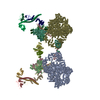 8bh3MC 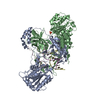 7zwaC 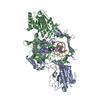 7zygC  8ascC 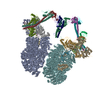 8bhvC 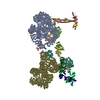 8bhyC M: atomic model generated by this map C: citing same article ( |
|---|---|
| Similar structure data | Similarity search - Function & homology  F&H Search F&H Search |
- Links
Links
| EMDB pages |  EMDB (EBI/PDBe) / EMDB (EBI/PDBe) /  EMDataResource EMDataResource |
|---|---|
| Related items in Molecule of the Month |
- Map
Map
| File |  Download / File: emd_16044.map.gz / Format: CCP4 / Size: 600.7 MB / Type: IMAGE STORED AS FLOATING POINT NUMBER (4 BYTES) Download / File: emd_16044.map.gz / Format: CCP4 / Size: 600.7 MB / Type: IMAGE STORED AS FLOATING POINT NUMBER (4 BYTES) | ||||||||||||||||||||||||||||||||||||
|---|---|---|---|---|---|---|---|---|---|---|---|---|---|---|---|---|---|---|---|---|---|---|---|---|---|---|---|---|---|---|---|---|---|---|---|---|---|
| Projections & slices | Image control
Images are generated by Spider. | ||||||||||||||||||||||||||||||||||||
| Voxel size | X=Y=Z: 1.304 Å | ||||||||||||||||||||||||||||||||||||
| Density |
| ||||||||||||||||||||||||||||||||||||
| Symmetry | Space group: 1 | ||||||||||||||||||||||||||||||||||||
| Details | EMDB XML:
|
-Supplemental data
-Additional map: Composite locally refined map
| File | emd_16044_additional_1.map | ||||||||||||
|---|---|---|---|---|---|---|---|---|---|---|---|---|---|
| Annotation | Composite locally refined map | ||||||||||||
| Projections & Slices |
| ||||||||||||
| Density Histograms |
-Half map: #2
| File | emd_16044_half_map_1.map | ||||||||||||
|---|---|---|---|---|---|---|---|---|---|---|---|---|---|
| Projections & Slices |
| ||||||||||||
| Density Histograms |
-Half map: #1
| File | emd_16044_half_map_2.map | ||||||||||||
|---|---|---|---|---|---|---|---|---|---|---|---|---|---|
| Projections & Slices |
| ||||||||||||
| Density Histograms |
- Sample components
Sample components
+Entire : NHEJ supercomplex bound to PAXX
+Supramolecule #1: NHEJ supercomplex bound to PAXX
+Macromolecule #1: DNA-dependent protein kinase catalytic subunit
+Macromolecule #2: X-ray repair cross-complementing protein 6
+Macromolecule #3: X-ray repair cross-complementing protein 5
+Macromolecule #4: Protein PAXX
+Macromolecule #5: DNA repair protein XRCC4
+Macromolecule #6: DNA ligase 4
+Macromolecule #7: DNA (25-MER)
+Macromolecule #8: DNA (27-MER)
+Macromolecule #9: DNA (26-MER)
+Macromolecule #10: DNA (28-MER)
-Experimental details
-Structure determination
| Method | cryo EM |
|---|---|
 Processing Processing | single particle reconstruction |
| Aggregation state | particle |
- Sample preparation
Sample preparation
| Concentration | 3 mg/mL |
|---|---|
| Buffer | pH: 8 |
| Grid | Model: Quantifoil R1.2/1.3 / Pretreatment - Type: GLOW DISCHARGE |
| Vitrification | Cryogen name: ETHANE |
- Electron microscopy
Electron microscopy
| Microscope | FEI TITAN KRIOS |
|---|---|
| Image recording | Film or detector model: GATAN K3 BIOQUANTUM (6k x 4k) / Average electron dose: 52.1 e/Å2 |
| Electron beam | Acceleration voltage: 300 kV / Electron source:  FIELD EMISSION GUN FIELD EMISSION GUN |
| Electron optics | C2 aperture diameter: 50.0 µm / Illumination mode: FLOOD BEAM / Imaging mode: BRIGHT FIELD / Cs: 2.7 mm / Nominal defocus max: 2.5 µm / Nominal defocus min: 0.8 µm / Nominal magnification: 130000 |
| Sample stage | Specimen holder model: FEI TITAN KRIOS AUTOGRID HOLDER / Cooling holder cryogen: NITROGEN |
| Experimental equipment |  Model: Titan Krios / Image courtesy: FEI Company |
 Movie
Movie Controller
Controller









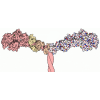




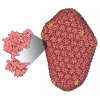

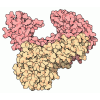
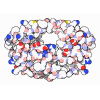



 X (Sec.)
X (Sec.) Y (Row.)
Y (Row.) Z (Col.)
Z (Col.)
















































